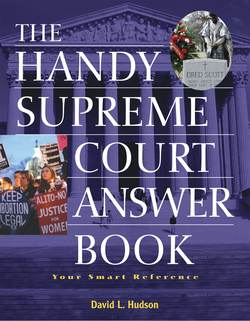Читать книгу The Handy Supreme Court Answer Book - David L Hudson - Страница 27
На сайте Литреса книга снята с продажи.
Have any federal judges been impeached?
ОглавлениеYes, several federal judges have been impeached by the House and many of those impeached by the House have been convicted in the Senate. The following federal judges have been impeached. Some resigned after the House voted to impeach, others were acquitted in the Senate and some were convicted by the Senate.
John Pickering (1803): U.S. District Court for the District of New Hampshire (impeached by House and convicted by the Senate)
Samuel Chase (1804–5): Associate Justice of the U.S. Supreme Court (impeached by the House in 1804 and acquitted by the Senate in 1805)
CourtSpeak: Modern View on Life Tenure of Supreme Court Justices
Chief Justice William Rehnquist (2004): “By guaranteeing judges life tenure during good behavior, the Constitution tries to insulate judges from the public pressures that may affect elected officials. The Constitution protects judicial independence not to benefit judges, but to promote the rule of law: judges are expected to administer the law fairly, without regard to public reaction….
“A natural consequence of life tenure should be the ability to benefit from informed criticism from legislators, the bar, academe, and the public. When federal judges are criticized for judicial decisions and actions taken in the discharge of their judicial duties, however, it is well to remember [a principle that has] long governed the tenure of federal judges…. Congress’ authority to impeach and remove judges should not extend to decisions from the bench. That principle was established nearly 200 years ago in 1805, after a Congress dominated by Jeffersonian Republicans impeached Supreme Court Justice Samuel Chase…. The political precedent set by Chase’s acquittal has governed the use of impeachment to remove federal judges from that day to this: a judge’s judicial acts may not serve as a basis for impeachment. Congress’s authority to impeach and remove judges should not extend to decisions from the bench….”
James H. Peck (1830): U.S. District Court for the District of Missouri (impeached by the House and acquitted by the Senate)
West H. Humphreys (1862): U.S. District Court for the Middle, Eastern and Western Districts of Tennessee (impeached by the House and convicted in the Senate)
Mark H. Delahay (1873): U.S. District Court for the District of Kansas (impeached by the House and resigned before trial in the Senate)
Charles Swayne (1904): U.S. District Court for the Northern District of Florida (impeached by the House and acquitted in the Senate)
Robert W. Archbald (1912): U.S. Commerce Court (impeached by the House and convicted by the Senate)
George W. English (1926): U.S. District Court for the Eastern District of Illinois (impeached by the House and resigned from office)
Harold Louderback (1933): U.S. District Court for the Northern District of California (impeached by the House and acquitted by the Senate)
Halsted L. Ritter (1936): U.S. District Court for the Southern District of Florida (impeached by the House and convicted by the Senate)
Harry E. Claiborne (1986): U.S. District Court for the District of Nevada (impeached by the House and convicted in the Senate)
Alcee L. Hastings (1988): U.S. District Court for the Southern District of Florida (impeached by the House and convicted in the Senate)
Walter L. Nixon (1989): U.S. District Court for the Southern District of Mississippi (impeached by the House and convicted by the Senate)
Only one U.S. Supreme Court justice, Samuel Chase, has ever been impeached by the House of Representatives. The Senate acquitted Chase in March 1803. In 1969, Justice Abe Fortas resigned from the U.S. Supreme Court after facing a threat of impeachment.
Samuel Chase is the only Supreme Court justice to be impeached by the House of Representatives. The Senate, however, acquitted him in March 1803. Hulton Archive/Getty Images.
